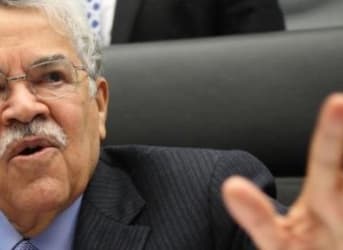OPEC has resisted the urging of its needier members and has decided not to cut production levels despite the five-month-old plunge in oil prices.
Saudi Oil Minister Ali al-Naimi said the 12 ministers at the meeting at OPECs’ Vienna headquarters on Nov. 27 decided to keep the production level at 30 million barrels per day, a ceiling set nearly three years ago.
The oil market responded immediately, with Brent crude dropping $3 to below $75 per barrel for the first time since September 2010.
The global price of oil has declined by more than 30 percent since mid-June because of a convergence of higher supply and lower demand. The supply side of the equation is the boom in US oil production, with American energy companies using hydraulic fracturing and horizontal drilling to harvest oil trapped in shale. The demand side is a slowing of the economies of Europe and China.
Related: Saudi Sending Negative Signals Ahead Of OPEC Meeting
The low prices for oil have hurt OPEC members such as Iran, Libya and Venezuela, which in recent weeks have called for a cut in the cartel’s production. But Saudi Arabia, OPEC’s most productive and influential member, has resisted these calls, and was able to fend off calls for a change in output at the Nov. 27 meeting.
The decision came as no surprise. As recently as the day before the cartel’s meeting, al-Naimi said it shouldn’t be up to OPEC to shore up prices artificially by reducing production. Instead, he said, “The market will stabilize itself eventually”.
Perhaps another reason OPEC didn’t cut output was to maintain its share in the market. It now generates about one-third of global oil production, but if it cut back it may lose market share to prolific producers such as Russia and the United States.
One observer who wasn’t surprised by OPEC’s decision is Michael Hewson, a market analyst at CMC Markets in London. “The balance of power has shifted,” he told Bloomberg News even before the cartel’s decision was announced, “and OPEC is accepting the fact that its ability to control the long-term price of oil is limited.”
The 12 OPEC ministers met for five hours, and afterward al-Naimi emerged to announce the results. “It was a great decision,” he said.
Related: Veteran Oil Minister Says OPEC Alone Can’t Set Oil-Price Levels
Less pleased was Venezuelan Foreign Minister Rafael Ramirez, the country’s former oil minister, who appeared angry as he left the session and refused to discuss the decision with reporters. Because of the low price of oil, Venezuela’s currency reserves are the lowest in nearly 11 years. The country’s president, Nicolas Maduro, says an appropriate price for oil would be $100 per barrel.
Gulf oil states are rich enough to bear the cost of lower oil prices, although one Gulf oil minister agreed with Venezuela that there’s an oil glut. “The market is oversupplied,” said Suhail al-Mazrouei, the energy minister for the United Arab Emirates. “But the oversupply is not from OPEC.”
ADVERTISEMENT
He was, at least in part, referring to the United States and its shale boom. But the US success also could be its undoing: If a price war follows OPEC’s decision, oil could drop to $60 per barrel, making shale extraction a losing proposition for American companies that rely on costly techniques such as hydraulic fracturing and horizontal drilling.
By Andy Tully of Oilprice.com
More Top Reads From Oilprice.com:
- Venezuela, Ignored By OPEC, Seeks Oil-price Relief Elsewhere
- Russia Expects Oil Price To Rise, But Not Enough To Balance Moscow’s Budget
- The 2014 Oil Price Crash Explained


















Saudis hedged their holdings in stocks that benefit from low oil prices.
even a hedge fund made for keeping their riyals steady during the predictable price plunge.
they could then reverse this just before a move to cut production later.
too bad for the trickle effect non-hedged participants like Venezuela!
both moves would have been an easy prediction within the industry.